
By The Blaine Bug Crew
The heat of summer might make us melt, but to knapweed, these hot, dry conditions create a perfect situation to thrive. We will be telling you about one of Blaine County’s most noxious invaders—spotted knapweed—and the insect we use to control it. Hopefully, this article will give you the tools to identify and control this foreign invader.
Spotted knapweed is an herbaceous, short-lived perennial reproducing entirely by seed, producing up to 25,000 seeds per plant, and can remain viable in the soil for up to eight years. Flowers range in color from pink to light purple and bloom from July to October. The bracts of the flower heads are black-tipped, giving the plant its characteristic “spotted” appearance. Seeds are brown to black in color, smooth, and less than 0.25 inches long. Stems are typically 2 to 4 feet tall with lower leaves that are deeply lobed and upper leaves that are more linear.
Spotted knapweed prefers moist rangeland habitats but is common in waste areas, roadsides, and pastures. To date, 13 biological control agents have been approved for release for the knapweed complex, which includes spotted knapweed. We use a bug called Larinus minutus to get rid of spotted knapweed. Here are some facts about it.
Larinus minutus is an abundant biological control agent utilizing spotted, diffuse, and squarrose knapweed. LA overwinters as an adult. Adults emerge in the spring when they begin to feed on knapweed foliage. Females produce between 28 and 130 eggs, laying in clusters in flowers. The eggs hatch and larvae feed on seeds and receptacle tissue for about a month. Larvae construct cocoons within the seedheads using pappus hairs and pupate. Emerging adults chew a characteristic round hole in the top of the cocoon that is visible when viewed from above.
In conclusion, knapweeds are very unpredictable. They can survive alarmingly hot weather and can also produce tons of seeds. As well, they can also survive very dry soils. It will take all of us to stop the spread of this noxious weed. If you have concerns about a spotted knapweed infestation, call the Blaine County Weed Department at (208) 727-7221.


